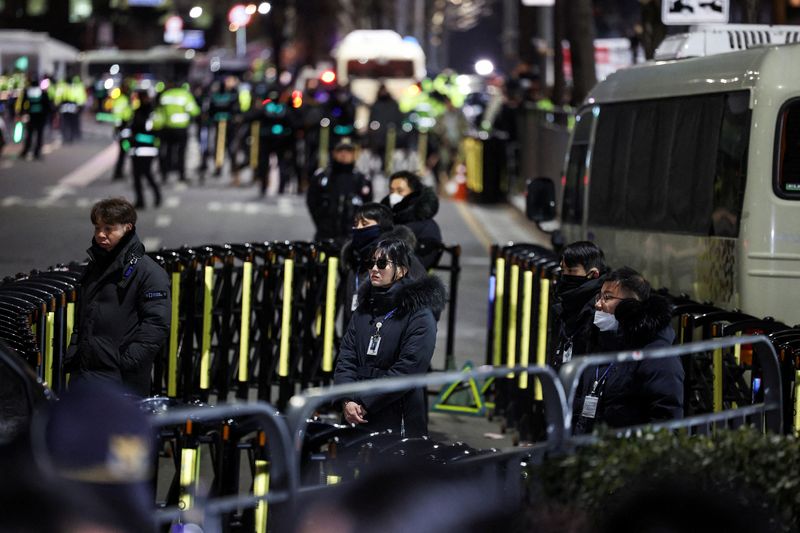By Hyunjoo Jin
SEOUL (Reuters) – The man who played a key role in preventing investigators from arresting accused South Korean President Yoon Suk Yeol is himself in the political crisis sparked by Yoon’s brief declaration of martial law last month caught in the spotlight.
Park Chong-jun, who reports directly to Yoon, was instrumental in rebuffing investigators’ attempt to serve an arrest warrant on Yoon on Friday, leading to a six-hour standoff at Yoon’s official residence.
Presidential guards and military troops prevented authorities from arresting Yoon for alleged insurrection under the arrest warrant, which is valid until Monday. The anti-corruption agency, which is leading the investigation alongside police, said on Friday it was working on its next steps.
Yoon’s declaration of martial law on December 3 stunned South Korea and led to his impeachment and removal from office on December 14. The president’s political fate lies in the hands of the Constitutional Court.
His legal fate is pitted against Yoon’s forces by a range of law enforcement agencies – with Park playing a crucial role.
Park, who was appointed by Yoon in September, had already played a role in blocking investigators from executing search warrants at the president’s offices and homes, citing national security.
“The Presidential Security Service exists solely to ensure the absolute security of the security target,” Park said in a statement on the service’s website, adding that there should be no gaps in its mission to protect the President “at every moment.”
He used this reasoning to reject Friday’s attempts to arrest Yoon, saying investigators had exceeded the limits of security laws and injured some security service personnel.
“OUT OF CONTROL”
Critics worry that the Parks Service is overreaching.
“The presidential security service is a dangerous institution whose power can spiral out of control,” said Han Seung-whoon, a professor of police administrative law at Dongshin University.
“Since only the president has the power to control it, the security service can abuse its power and become the president’s private army.”
The anti-corruption agency, the Corruption Investigation Office for High-ranking Officials (CIO), said it had to call off Friday’s arrest attempt out of fears for the safety of its staff.
Yoon’s security detail and the troops he controls outnumber the arresting officers, the CIO said. At some point, it was said, Yoon’s people formed a human chain of about 200 people to block access to Yoon and his official residence, while buses and military vehicles were also used as blockades.
On Friday, police announced they were investigating Park for possible obstruction of justice and ordered him to appear for questioning. He declined for the time being, saying he was not allowed to stay away from work even for a moment at this critical time.
Park and his deputy are in discussions to provide investigators with an answer at a later date, the security service said.
The police asked him on Saturday to appear on Tuesday.
Yoon’s lawyers claim that the CIO does not have the authority to investigate the riot, making the arrest warrant illegal.
A court approved the arrest warrant on Tuesday, the first against a sitting president, after Yoon ignored repeated summonses for questioning.
Controversial history
Critics of the president’s security service call it a relic from the era of South Korea’s strong leaders who ruled until the late 1980s.
During military rule in the 1970s and 1980s, it was under the direct control of the president and was run by loyal aides who wielded immense power.
After then-President Park Geun-hye was impeached in 2016, lawmakers who called the service an “idea of an authoritarian military regime” proposed changes to transfer it to a police department.
They also tried to demote their boss’s rank, but reform efforts appear to have stalled.
Park’s predecessor in the presidential security service is Kim Yong-hyun, a close ally of Yoon who resigned in September when he was named defense minister.
Kim has since resigned from the latter post and been indicted on insurgency charges and is accused of playing a key role in recommending and preparing the martial law attempt.
The statement, which Yoon retracted six hours later when the opposition-controlled parliament defied him, banned political activity and attempted to control the media.
Park, a former senior police officer who failed in two parliamentary candidacies in 2012 and 2016, graduated at the top of his class at the Korea National Police University and was promoted to deputy chief of the national police agency in 2011.
In 2012, he helped conservative Park Geun-hye in her successful presidential bid and then became deputy chief of presidential security until 2015.
When Park Chong-jun was named head of the presidential security service, Yoon’s chief of staff said he would help build “an advanced security system.”

The opposition called for his arrest for blocking Yoon’s arrest and pushed for an investigation into his alleged role in declaring martial law.
According to media reports, he denied the allegations after being questioned as a witness in the investigation into this statement.





